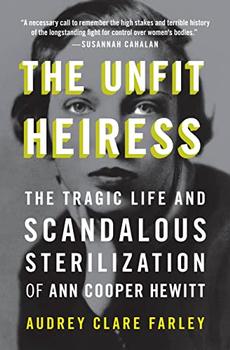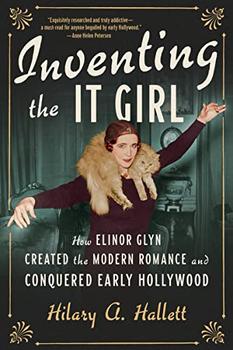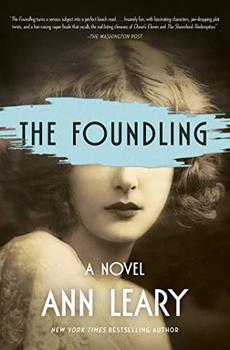Summary | Excerpt | Reviews | Beyond the book | Read-Alikes | Genres & Themes | Author Bio

The Tragic Life and Scandalous Sterilization of Ann Cooper Hewitt
by Audrey FarleyFor readers of The Immortal Life of Henrietta Lacks and The Phantom of Fifth Avenue, a page-turning drama of fortunes, eugenics and women's reproductive rights framed by the sordid court battle between Ann Cooper Hewitt and her socialite mother.
At the turn of the twentieth century, American women began to reject Victorian propriety in favor of passion and livelihood outside the home. This alarmed authorities, who feared certain "over-sexed" women could destroy civilization if allowed to reproduce and pass on their defects. Set against this backdrop, The Unfit Heiress chronicles the fight for inheritance, both genetic and monetary, between Ann Cooper Hewitt and her mother Maryon.
In 1934, aided by a California eugenics law, the socialite Maryon Cooper Hewitt had her "promiscuous" daughter declared feebleminded and sterilized without her knowledge. She did this to deprive Ann of millions of dollars from her father's estate, which contained a child-bearing stipulation. When a sensational court case ensued, the American public was captivated. So were eugenicists, who saw an opportunity to restrict reproductive rights in America for decades to come.
This riveting story unfolds through the brilliant research of Audrey Clare Farley, who captures the interior lives of these women on the pages and poses questions that remain relevant today: What does it mean to be "unfit" for motherhood? In the battle for reproductive rights, can we forgive the women who side against us? And can we forgive our mothers if they are the ones who inflict the deepest wounds?
A talented historical storyteller, Farley intermingles Ann's suffering and Maryon's hedonism with cultural details that frame the eugenics era; I imagine most readers will be as enlightened by the specifics of this unspoken time in American history as I was and feel contempt for those who let the trauma continue. However, there are flaws with this strategy. By steering the sterilization trauma lens away from Ann and onto other victims and the men behind eugenics, she alienates readers who have just gotten comfortable with the mother-daughter story. Still, I loved the meat and potatoes of the story in all of its forms: historical trauma, petty revenge, social climbing, racist motivations, legal gamesmanship...continued
Full Review
 (896 words)
(896 words)
(Reviewed by Valerie Morales).
In The Unfit Heiress, Audrey Clare Farley sets the case of San Francisco socialite Ann Cooper Hewitt against the backdrop of the American eugenics movement. In the age of eugenics, which lasted approximately from the 1920s to the 1940s, 30 states embraced laws allowing involuntary sterilization. North Carolina was one of the worst, partly because it continued its eugenics program into the 1970s, while eugenics had fallen out of favor in most states after World War II. The state sterilized over 7,000 people, including rape and incest victims, Black girls and poor white ones.
Latoya Adams, whose aunt, Deborah Blackmon, became a victim of sterilization in 1972, observed, "These people were dehumanized. They treated them like animals." The ...

If you liked The Unfit Heiress, try these:

by Hilary A. Hallett
Published 2024
The modern romance novel is elevated to a subject of serious study in this addictively readable biography of pioneering celebrity author Elinor Glyn.

by Ann Leary
Published 2023
From the New York Times bestselling author of The Good House, the story of two friends, raised in the same orphanage, whose loyalty is put to the ultimate test when they meet years later at a controversial institution - one as an employee; the other, an inmate.
These are not books, lumps of lifeless paper, but minds alive on the shelves
Click Here to find out who said this, as well as discovering other famous literary quotes!